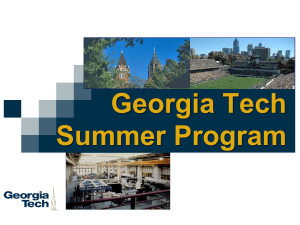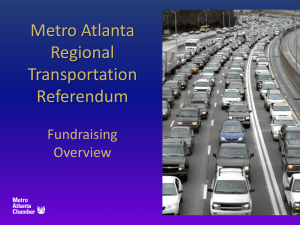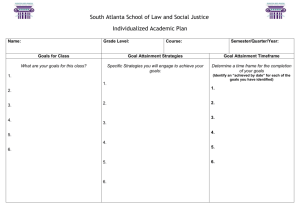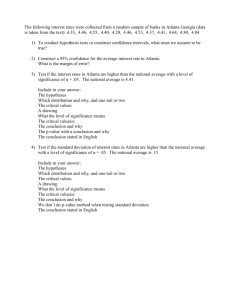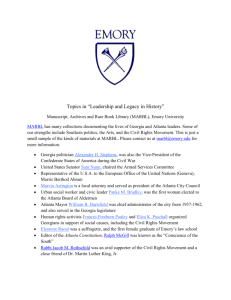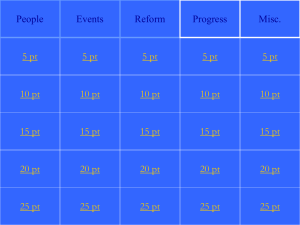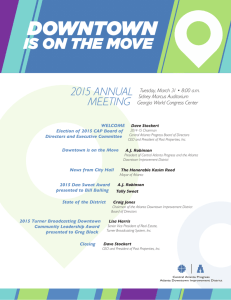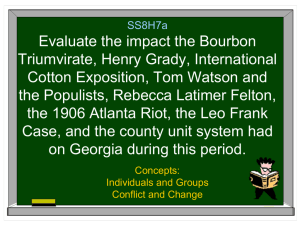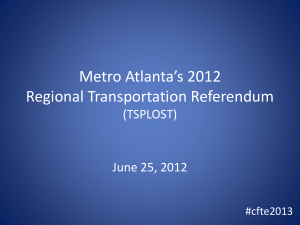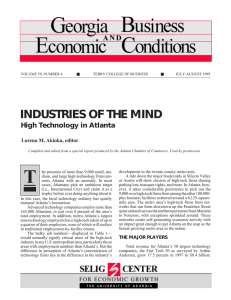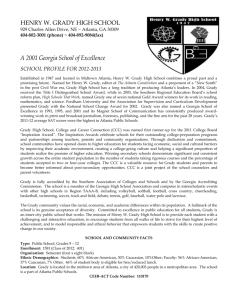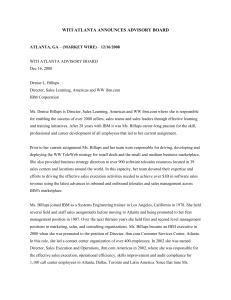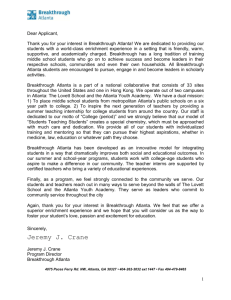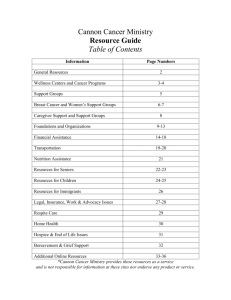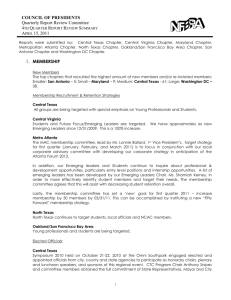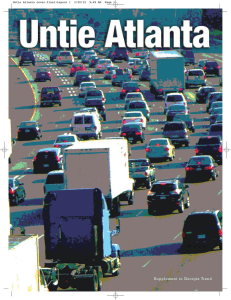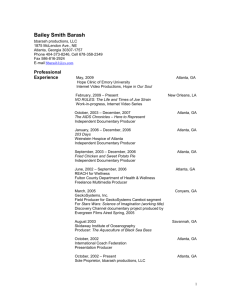Shifting the emphasis from whittled wallets to whittled lives
advertisement
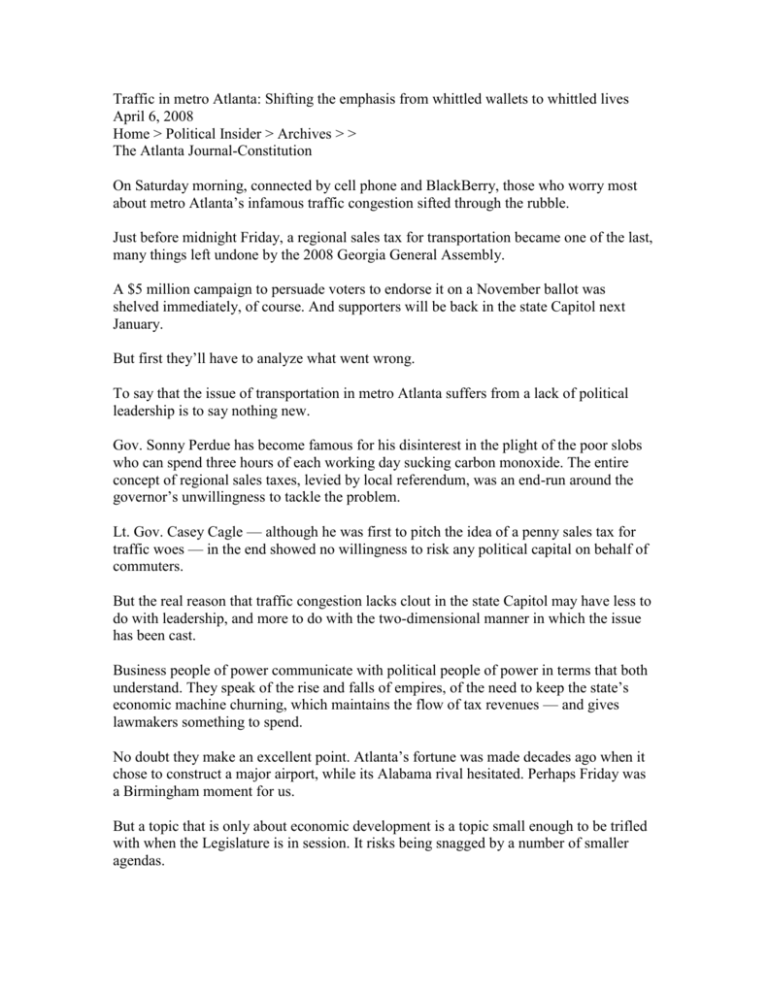
Traffic in metro Atlanta: Shifting the emphasis from whittled wallets to whittled lives April 6, 2008 Home > Political Insider > Archives > > The Atlanta Journal-Constitution On Saturday morning, connected by cell phone and BlackBerry, those who worry most about metro Atlanta’s infamous traffic congestion sifted through the rubble. Just before midnight Friday, a regional sales tax for transportation became one of the last, many things left undone by the 2008 Georgia General Assembly. A $5 million campaign to persuade voters to endorse it on a November ballot was shelved immediately, of course. And supporters will be back in the state Capitol next January. But first they’ll have to analyze what went wrong. To say that the issue of transportation in metro Atlanta suffers from a lack of political leadership is to say nothing new. Gov. Sonny Perdue has become famous for his disinterest in the plight of the poor slobs who can spend three hours of each working day sucking carbon monoxide. The entire concept of regional sales taxes, levied by local referendum, was an end-run around the governor’s unwillingness to tackle the problem. Lt. Gov. Casey Cagle — although he was first to pitch the idea of a penny sales tax for traffic woes — in the end showed no willingness to risk any political capital on behalf of commuters. But the real reason that traffic congestion lacks clout in the state Capitol may have less to do with leadership, and more to do with the two-dimensional manner in which the issue has been cast. Business people of power communicate with political people of power in terms that both understand. They speak of the rise and falls of empires, of the need to keep the state’s economic machine churning, which maintains the flow of tax revenues — and gives lawmakers something to spend. No doubt they make an excellent point. Atlanta’s fortune was made decades ago when it chose to construct a major airport, while its Alabama rival hesitated. Perhaps Friday was a Birmingham moment for us. But a topic that is only about economic development is a topic small enough to be trifled with when the Legislature is in session. It risks being snagged by a number of smaller agendas. “The Metro Atlanta Chamber should have spent more time lobbying for [the transportation sales tax] and less time lobbying against the Grady bill,” growled state Sen. David Shafer (R-Duluth) shortly after midnight on Friday. Shafer, who voted against the transportation sales tax, was still smarting from the defeat that morning of his effort to apply strict standards of conduct to the new non-profit board governing Grady Memorial Hospital. The sales tax legislation fell three shorts vote of the two-thirds majority needed for passage in the Senate. But the measure passed in the House. The difference may have been House Speaker Glenn Richardson, who — when he’s not challenging the virility of his opponents — can be one of the most eloquent and compelling voices in the Legislature. In an address from the well on the transportation sales tax last month, Richardson avoided the economics of traffic congestion almost entirely. Instead, he argued as a social conservative. Government inaction on traffic congestion amounted to the theft of time from families, Richardson said, as he detailed his struggles to drive from downtown Atlanta into Cobb County to see the first pitch of his son’s ballgame. “How many people are missing a part of their family’s lives? How many people could be home with their family or at the ball game with their son, that are sitting in traffic?” he asked. Mike Huckabee, at the height of his Republican presidential efforts this winter, made the same point during a stop in Atlanta. He termed traffic congestion — and the missed recitals and suppers it forces — “a waste of social capital.” Whittled-down wallets spark concern. Millions of whittled-down lives stir passion. Get Georgia Moving, the coalition pushing the regional sales tax, is a disparate collection of business leaders, government officials, road contractors and environmentalists. They have surprised themselves by hanging together this far. Next year, they may have another member. Sadie Fields, leader of the Georgia Christian Alliance, says she likes Richardson’s approach to traffic as a family matter. “I think that’s a very good argument,” she said. When Christian conservatives and the business community form an alliance, they’re very hard to beat, she said. “That’s a marriage that probably should take place.”
